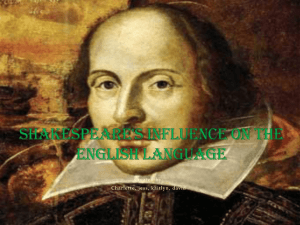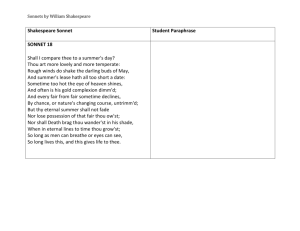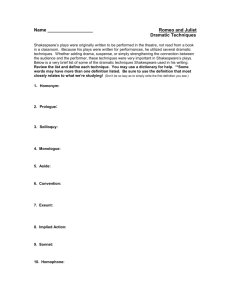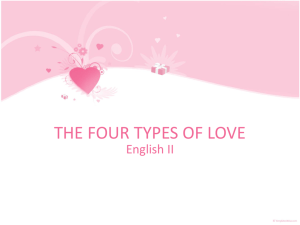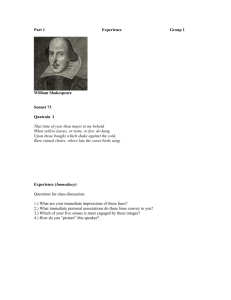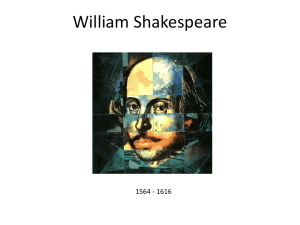Romeo og Julie workshop
advertisement
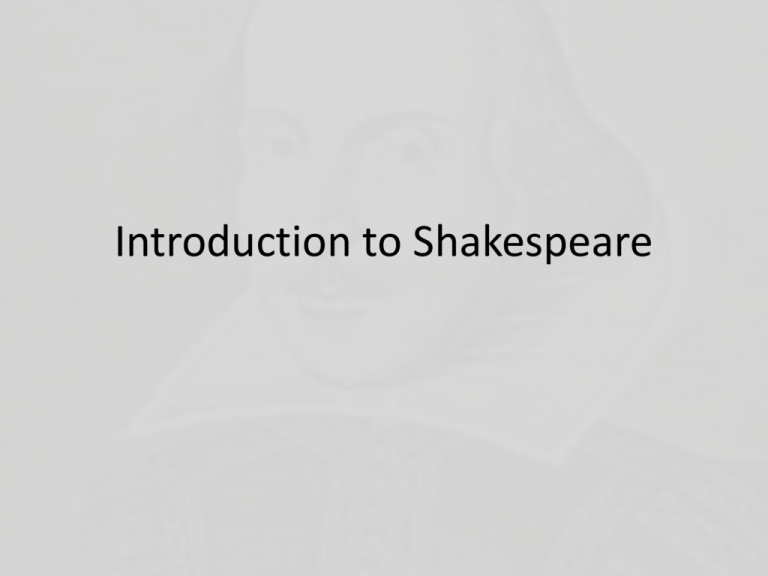
Introduction to Shakespeare Plan for this talk 1. 2. 3. 4. England at Shakespeare’s time The Renaissance in London and in the theatre Three types of plays Shakespeare’s themes 1. 2. 3. Love Power Order - the Chain of Being 5. Shakespeare’s language 6. Shakespeare as a Renaissance writer 2 Elisabeth og James I Shakespeare 1564 - 1616 • Stability – well… sort of • After civil war, reformation, fighting within the Tudor family over who should rule, fear of Spain • Henry, Edward, Mary, Elizabeth, • First colonies, Spanish gold, the weather in 1588 • Still: religious ”cleansing,” fear of war, uncertainty about succession • 1603: James I – new royal family: the Stuarts 3 4 5 The Rose – cutaway 6 The stage at Shakespeare’s Globe 7 Three types of plays • Comedy: young persons want to get married, there is some obstacle, the obstacle is removed, everyone is happy. • Tragedy: a person is led to his (her) death by fate or by his own personality. He and others die. – History play: a tragedy, but with characters from English or Roman history 8 Shakespeare’s themes • Love – Courtly love – New view of marriage Modern readers’ themes • The Renaissance – the chain of being • Power • Language • Identity • Gender and race 9 Courtly love • Courtly Love: A formal declaration of love from a man to another person. • Mostly came in the form of the sonnet: 14 lines of five iambs . _ • abab cdcd efef gg • Example in a second… • Shakespeare produced 154 sonnets • He uses the sonnet form for formal occasions in his plays. 10 Sonnet 18 (the first 4 lines) . - . Shall I . . - . - com pare thee to a sum mer’s - . - - . - Thou art more love ly and more tem pe rate . - . - . - - . Rough winds do shake the dar ling buds of May . - - . - . - . And sum mer’s lease hath all too short a date . - . . . . Day - - 11 SONNET 18 Shall I compare thee to a summer's day? Thou art more lovely and more temperate: Rough winds do shake the darling buds of May, And summer's lease hath all too short a date: Sometime too hot the eye of heaven shines, And often is his gold complexion dimm'd; And every fair from fair sometime declines, By chance or nature's changing course untrimm'd; But thy eternal summer shall not fade Nor lose possession of that fair thou owest; Nor shall Death brag thou wander'st in his shade, When in eternal lines to time thou growest: So long as men can breathe or eyes can see, So long lives this and this gives life to thee. 12 Marriage • Traditonal view of marriage: • Decided by parents, based on what was good for the family • In the renaissance we meet the idea that marriage could be based on feeling • Many of Shakespeare’s play deal with this: How and if it is possible to make both the parents and the young persons happy about a marriage. • All the comedies are about this 13 Power • Three subthemes: – What must a person do to get/keep power – How does getting power change a person – What happens when no one assumes power • Two renaissance thinkers: – Machiavelli, ”The Prince” 1532 – about how to be a strong ruler – Thomas Hobbes, ”Leviathan” 1651 – about the chaos of the Kingless society 14 Order! The chain of being • Each person had a particular role to play in the world. Breaking this role would make the world ”go wrong” – If a non-King tried to become King – If a woman behaved like a man – If humans entered the world of e.g. fairies or witches • If this happened nature might misbehave: – unseasonal weather or animals behaving strangely – magical things occurring, e.g. a man with a donkey’s head – ghosts 15 Pic 16 17 Language • Shakespeares language in the plays is mostly ”blank verse” – five iambs, no rhyme Blank verse: Hamlet, I, 4 – The air bites shrewdly; it is very cold • Variations: – Non-nobels/common people speak prose – Mythological creatures often rhyme – Rhymed lines should make you pay attention • In other words: we can (often) tell a character’s position on the chain of being from his language. 18 Language 2 • How to say ”you” – singular • nom: thou • akk + dat: thee • gen: thy/thine – plural • nom, akk, dat: you • gen: your/yours • Oldfashioned verb forms – 2nd sg: -(s)t • thou lovest – 3rd sg: th • he loveth – §§110-111 in EGS 19 The renaissance • New view of marriage • Focus on the individual’s role in society – and in the world • The magical/mythological world parallel to the human world • The strong ruler • The ”something-for-everybody” plays 20

